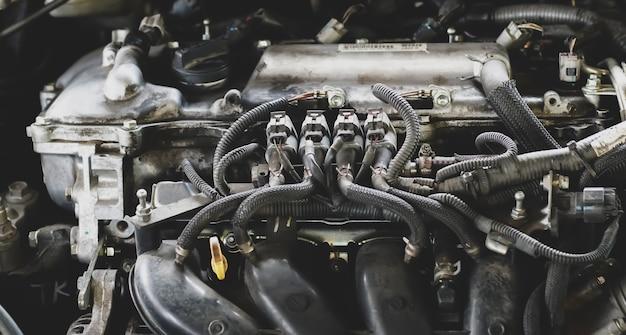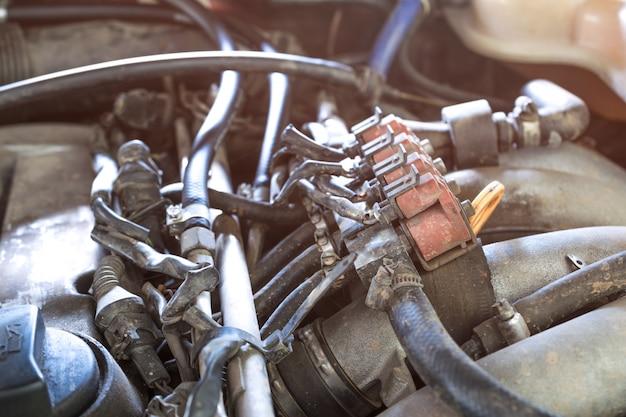Fuel injectors are an essential component of a car’s fuel system. They play a vital role in delivering fuel to the engine cylinders at the right time and in the correct amount. But have you ever wondered how many fuel injectors your car actually has? In this blog post, we will explore the number of fuel injectors present in different types of vehicles and answer some frequently asked questions related to fuel injectors.
From V6 engines to V8 powerhouses, we will examine the number of injectors each engine type typically has. We will also discuss the factors that can cause fuel injectors to fail and the symptoms of a bad injector. Additionally, we’ll cover the costs involved in replacing fuel injectors and whether it is worth it to clean or replace them.
So, whether you’re a car enthusiast or simply curious about how your car works, keep reading to discover everything you need to know about how many fuel injectors your car has and how to maintain them properly.

How Many Fuel Injectors Does a Car Have?
If you’ve ever wondered about the inner workings of a car, you might find yourself pondering the number of fuel injectors it possesses. Well, my curious friend, I’m here to enlighten you on this puzzling matter.
Understanding the Role of Fuel Injectors
Before we dive into the specifics, let’s first grasp the crucial role fuel injectors play in a car’s engine. These tiny marvels are responsible for delivering fuel to the engine’s combustion chambers in a precise manner. By spraying fuel directly into the cylinders, they ensure optimal fuel distribution and combustion efficiency.
It’s a Matter of Cylinder Count
Now, let’s get down to business and address the question at hand: How many fuel injectors does a car have? Well, the answer ultimately depends on the number of cylinders the engine possesses.
Four-Cylinder Cars
In the realm of four-cylinder cars, you’ll typically find one fuel injector per cylinder. This means you’ll have a grand total of four fuel injectors bustling away, performing their fuel-spraying magic.
Six-Cylinder Cars
As we move up the cylinder count ladder, things become a tad more interesting. With six-cylinder cars, the number of fuel injectors usually increases. Expect to find six fuel injectors in these boosted machines, ensuring each cylinder receives its fair share of fuel.
Eight-Cylinder Cars
Ah, the mighty eight-cylinder beasts! These powerhouses pack quite a punch, and their thirst for fuel is equally fierce. To satisfy the voracious appetite of each cylinder, you’ll typically find eight fuel injectors working diligently under the hood.
Beyond Eight Cylinders
But we don’t stop at eight cylinders, do we? Cars with more than eight cylinders, such as high-performance sports cars or certain luxury vehicles, follow the same principle of one fuel injector per cylinder. So, a 10-cylinder car would boast 10 fuel injectors, a 12-cylinder car would flaunt 12, and so on.
From Multipoint to Direct Injection
Now that we’ve covered the cylinder-to-injector ratio, it’s worth mentioning the evolution of fuel injection systems. While older cars often sported a multipoint fuel injection system (where each injector sprays fuel into the intake manifold), modern cars have welcomed the reign of direct injection.
Direct injection systems take the efficiency game to a whole new level by injecting fuel directly into each cylinder. This means each cylinder has its own fuel injector, ensuring precise fuel delivery and enhanced performance.
So, dear automobile aficionados, the number of fuel injectors in a car is intricately tied to the vehicle’s cylinder count. Whether you’re cruising in a four-cylinder, six-cylinder, or eight-cylinder vehicle, you can rest assured that every cylinder has its dedicated fuel injector, working tirelessly to keep your engine running smoothly.
Now that you’re armed with this knowledge, next time someone asks, “How many fuel injectors does a car have?” you can confidently enlighten them with your newfound wisdom. Until then, happy driving!

FAQ: How Many Fuel Injectors Does a Car Have?
How Long Does It Take to Replace a Fuel Injector
Replacing a fuel injector can be a relatively quick process, taking anywhere from 30 minutes to a couple of hours. However, the duration can vary depending on the specific car model and the accessibility of the fuel injector.
How Many Injectors Does a V6 Have
Most V6 engines typically have six fuel injectors, with each injector responsible for delivering fuel to one of the six cylinders in the engine.
What Causes Fuel Injectors to Fail
Several factors can contribute to fuel injector failure. Common causes include clogging due to carbon build-up, internal damage from contaminants in the fuel, electrical malfunctions, or wear and tear over time.
What Happens When One Injector Fails
When a fuel injector fails, it can lead to a variety of issues. These can include poor engine performance, decreased fuel efficiency, rough idling, misfires, and even potential damage to the catalytic converter.
Are Fuel Injectors Expensive
The cost of fuel injectors can vary depending on the make and model of your car. Generally, fuel injectors are considered moderate to high-priced components due to their precision engineering and importance in the fuel delivery system.
How Much Does It Cost to Replace One Fuel Injector
The cost of replacing a single fuel injector can range from $100 to $300, including parts and labor. However, prices can vary depending on the car’s make, model, and the specific injector required.
How Often Should Fuel Injectors Be Cleaned
Fuel injector cleaning is typically recommended every 30,000 to 50,000 miles or as specified in your vehicle’s maintenance schedule. Regular cleaning helps prevent clogging and ensures optimal engine performance.
What Are the Symptoms of a Bad Fuel Injector
A bad fuel injector can manifest in various ways. Common symptoms include engine misfires, rough idling, poor acceleration, decreased fuel efficiency, or an overpowering smell of gasoline.
Where Are My Fuel Injectors Located
Fuel injectors are typically located within the intake manifold or the cylinder head. They are strategically positioned to deliver fuel directly into the intake ports or combustion chambers, depending on the engine design.
Is It Worth Replacing Fuel Injectors
Whether it’s worth replacing fuel injectors depends on the specific situation and the severity of the problem. If you are experiencing significant performance issues or multiple injectors have failed, it may be necessary to replace them to restore optimal engine function.
Does a V6 Have Six Fuel Injectors
Yes, a V6 engine usually has six fuel injectors. Each injector is responsible for delivering fuel to one of the six cylinders in the engine.
Will a Bad Fuel Injector Trigger an Engine Code
Yes, a malfunctioning fuel injector can often trigger an engine code, typically related to a misfire or fuel system issue. Using an OBD-II scanner can help identify the specific trouble code associated with the faulty fuel injector.
Is It Better to Clean or Replace Fuel Injectors
Cleaning or replacing fuel injectors depends on the severity of the issue. In cases of minor clogging or contamination, cleaning may be sufficient. However, if the injector is damaged, it is often more effective to replace it.
How Many Cylinders Does a V6 Have
As the name suggests, a V6 engine has six cylinders. Each cylinder houses a piston that moves up and down, generating the power necessary to propel the vehicle.
Can I Clean My Fuel Injectors Instead of Replacing Them
In certain cases, cleaning fuel injectors can effectively resolve performance issues. However, it is important to note that not all injectors can be cleaned and that severe or persistent problems may require replacement.
Who Had the First V8 Engine
The first V8 engine was developed by the Frenchman Leon Levavasseur in 1902. Levavasseur’s V8 engine was an aviation engine, but the design laid the foundation for the V8 engines used in automobiles today.
How Many Injectors Does a V8 Have
A V8 engine typically has eight fuel injectors, with each injector responsible for fuel delivery to one of the eight cylinders in the engine.
Can a V6 Engine Run on Four Cylinders
Some modern V6 engines come equipped with technologies such as cylinder deactivation, which allows them to run on fewer cylinders under light load conditions. This feature helps improve fuel efficiency without sacrificing power.
How Long Do Fuel Injectors Last
Fuel injectors can last for many years if well-maintained. However, environmental factors, fuel quality, and regular upkeep play essential roles in their longevity. In general, you can expect fuel injectors to last between 50,000 and 100,000 miles.
Can You Replace a Single Fuel Injector
Yes, it is possible to replace a single fuel injector if only one injector is experiencing issues. However, it is worth considering the condition and age of the other injectors to ensure optimal performance in the long run.
Why Are Fuel Injectors So Expensive
The cost of fuel injectors reflects the precision engineering and advanced technology involved in their production. They are vital components in the fuel delivery system and undergo rigorous testing to meet strict quality standards.
Why Is a V8 Engine Better Than a V6
A V8 engine often offers superior performance due to its increased power and torque capabilities. It is ideal for applications that demand high horsepower, such as towing heavy loads or providing exhilarating acceleration.
Is a V8 Engine Fast
A V8 engine can certainly provide impressive speed and acceleration, but the overall performance of a vehicle depends on various factors, including its weight, aerodynamics, transmission, and other components. A V8 engine alone does not guarantee speed, but it certainly has the potential to deliver thrilling performance.
Now you have a better understanding of fuel injectors and their role in your car’s performance. Whether you’re dealing with a misfire, contemplating replacement, or simply curious about the inner workings of your engine, this FAQ guide has provided you with valuable information. Keep your fuel injectors in good shape, and they’ll continue to deliver the power and efficiency you expect.